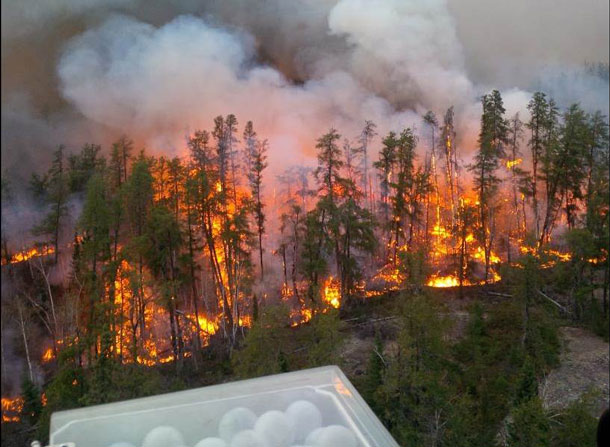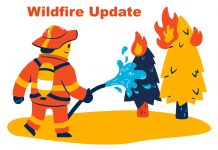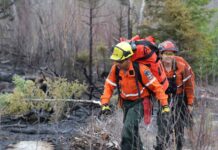
THUNDER BAY – WILDFIRE UPDATE – There are no new fires to report in the Northeast Region, as of early afternoon on May 27. Five fires remain active in the region. North Bay 8 is under control at 0.8 of a hectare; Sault 18 covers 9 hectares and is also under control.
Fires of Note:
Hearst 4 is currently listed at 475 hectares and not under control, and Hearst 5 is not under control and is currently estimated to be 2574 hectares in size. Fourteen crews are committed to these two fires and are working along the perimeter to contain them. Helicopters are also onsite to support crew movements with water application as necessary.
Wawa 7 (located west of White River) is currently listed as not under control at 294 hectares. Crews have made good progress on the southern fire edge near the highway. Fire Crews will continue to work this edge in an effort to minimize effects of the fire on commuters. Good progress is being reported on this fire.
The forest fire hazard is low to high across the region. Please refer to the Forest Fire Information Map to verify the forest fire hazard in your area.
Following a resource request made by Ontario to the Canadian Interagency Forest Fire Centre (CIFFC), Ontario has received 121 fire response personnel from Saskatchewan, British Columbia and Newfoundland as of May 26.
Ontario has also received 20 personnel from Wisconsin as part of the Great Lakes Forest Fire Compact (GLFFC). The GLFFC is made up of three U.S. States and two Canadian Provincial Natural Resources agencies. They have created a formal association in order to promote effective prevention, pre-suppression and control of forest fires in the Great Lakes Region of the United States and adjacent areas of Canada.
The province of Ontario has sent two flight coordinators to CIFFC in Winnipeg, Manitoba to assist in coordinating national aircraft for interprovincial / international movements of firefighting staff.
Ontario currently has 85 personnel deployed in Alberta, including FireRangers, Agency Representatives, Division Supervisors, Strike Team Leaders, Helicopter Officers, a Supply Unit Leader a Service Branch Director and an Incident Management Team.
Adopt safe campfire practices! Choose the site of your campfire carefully and keep your fire small. Stay nearby: never leave your campfire unattended. Put your fire out by drowning it with water. Be sure that the fire is extinguished. Stir the ashes with a stick to uncover hot coals and then drown it again. You can never be too safe!
For further tips on how to be FireSmart, visit: ontario.ca/firesmart.
For more information about the current fire situation and the active fires map: ontario.ca/forestfire.
Report forest fires by calling 310-FIRE (3473).




